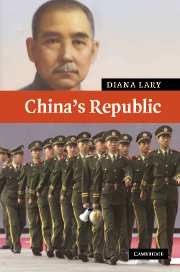Book contents
- Frontmatter
- Contents
- List of illustrations
- List of maps
- List of tables
- Acknowledgments
- Introduction
- 1 The decline of empire, the dream of a republic: 1890s–1911
- 2 The early Republic – chaos and creativity: 1912–28
- 3 The Nanjing decade – a new beginning? 1928–37
- 4 The Resistance War – warfare and chaos: 1937–45
- 5 The Civil War – the most vicious conflict: 1946–9
- 6 More than survival – the Republic on Taiwan: 1949 to the present
- Conclusion: the end of the Republic?
- Index of names
- Index of places
- Index of subjects
- References
6 - More than survival – the Republic on Taiwan: 1949 to the present
Published online by Cambridge University Press: 05 June 2012
- Frontmatter
- Contents
- List of illustrations
- List of maps
- List of tables
- Acknowledgments
- Introduction
- 1 The decline of empire, the dream of a republic: 1890s–1911
- 2 The early Republic – chaos and creativity: 1912–28
- 3 The Nanjing decade – a new beginning? 1928–37
- 4 The Resistance War – warfare and chaos: 1937–45
- 5 The Civil War – the most vicious conflict: 1946–9
- 6 More than survival – the Republic on Taiwan: 1949 to the present
- Conclusion: the end of the Republic?
- Index of names
- Index of places
- Index of subjects
- References
Summary
In 1945 Taiwan was reintegrated into China as a province, after fifty years under Japanese colonial rule. Four years later it became the only home of the Chinese Republic, as the Communists swept to power on the Mainland and established the People's Republic of China. Taiwan had an existing tradition as an island of exile. At the end of the Ming dynasty one of the last loyalists, Zheng Chenggong (Cheng Ch'eng-kung), fled to the island and set up the first Chinese administration there, in Tainan.
After 1949 the People's Republic of China isolated itself from its Asian neighbors and turned toward its new ally, the Soviet Union. The sudden expansion of Communist power in Asia created something close to panic in the West. The United States moved to resist further “Red” expansion, and was soon involved in the Korean War and in protecting Taiwan from invasion from the Mainland. With this protection, the GMD was able to maintain the fiction that the Republic represented all of China, and that its exile was temporary. The GMD's pledge to reconquer the Mainland seemed less far-fetched in the late 1950s and 1960s, when the Mainland was convulsed by the Great Leap Forward and the Cultural Revolution, and seemed on a path to self-destruction. Taiwan's economy flourished, though it remained under tight authoritarian control.
- Type
- Chapter
- Information
- China's Republic , pp. 178 - 210Publisher: Cambridge University PressPrint publication year: 2007



